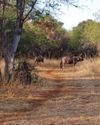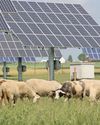
Why do producers have to change the way they farm?
Our world is in peril. Economies and societies globally are becoming more fragmented and disconnected, with the COVID-19 pandemic and the war in Ukraine revealing just how broken these systems have become.
We’re seeing increased antagonism between the US and China as power shifts from the west to the east, Brexit deepening the divide between the UK and EU, civil wars taking their toll in places like Afghanistan, Syria and South Sudan, and many domestic political challenges, not only in South Africa, but internationally. Lawlessness from both the elite and the populist movements are on the rise.
Besides these man-made disasters, we also have natural disasters, such as droughts and floods, which are predicted to increase because of climate change.
The World Economic Forum publishes an annual global risk report. This year, six of its top 10 longterm risks were directly environmental, with only one, cybercrime at number 8, not having any environmental link. We are hacking the world apart, and the problem is that there is no Planet B.
Farmers are the principal custodians and users of land and water. As such, they have a major impact on food security as well as the health of the environment. However, environmental degradation, the huge escalation in input costs, geopolitics, and adverse climatic conditions have rendered the conventional model of farming, where farmers add more and more chemicals and machinery to grow crops, unsustainable.
Over the past 15 years, for example, the number of dairy farmers in South Africa has decreased from 4 000 to fewer than 1 000.
Can you give an example of geopolitical issues?
Denne historien er fra May 19, 2023-utgaven av Farmer's Weekly.
Start din 7-dagers gratis prøveperiode på Magzter GOLD for å få tilgang til tusenvis av utvalgte premiumhistorier og 9000+ magasiner og aviser.
Allerede abonnent ? Logg på
Denne historien er fra May 19, 2023-utgaven av Farmer's Weekly.
Start din 7-dagers gratis prøveperiode på Magzter GOLD for å få tilgang til tusenvis av utvalgte premiumhistorier og 9000+ magasiner og aviser.
Allerede abonnent? Logg på

When short-term rentals make sense
Bianca Smit, national operations manager at CFAO Equipment SA, outlines factors to consider when choosing a rental equipment partner.

The timing of onion sowing is critical
Each onion variety has a different resistance to bolting, thus growers need experience and knowledge to guide them,

Understanding cannabis and hemp regulations in South Africa
South Africa's cannabis and hemp regulations remain a topic of debate and uncertainty, particularly when it comes to commercial use and small-scale production. Cannabis experts Shaad Vayej and Trenton Birch spoke to Octavia Avesca Spandiel about the challenges that small-scale cannabis and hemp farmers face.

European seed's influence on the US cannabis market
The expansion of European cannabis seed onto the US market is not just about economic growth; it’s also about enriching the landscape of US cannabis with diversity, innovation and education,

'It's important to get the right tool for the job'
The adoption of technology is crucial to sustaining efficiency gains and beating the cost-price squeeze in the agriculture sector.

A brilliant bushveld break between Bela-Bela and Modimolle
The distinctive touch, diligence, and 24/7 customer care are just a few of the reasons you should visit four-star Tourism Council-graded Pumula Game Farm,

John Deere: elevating performance and efficiency in modern farming
In the fast-paced world of farming, the right tools make all the difference.

The naval disaster Winston Churchill tried to hide
Three British warships were sunk by German naval gunfire on a dark day early in World War II, but the heroes who fought back received only muted recognition, possibly to avoid bad publicity,

Breaking down the principles of regenerative farming
Jean Hugo, a post-graduate student at the Tshwane University of Technology, and Leon Hugo, author on environmental matters and former professor of geography at the University of Pretoria, write about the importance of regenerative agriculture for small-scale farmers, and the challenges related to making the shift.

Ectoparasite control: more tips for livestock farmers
To reduce the mayhem that uncontrolled ectoparasites can create for communal farmers, it’s best to adopt a holistic approach in conjunction with veterinary remedies,